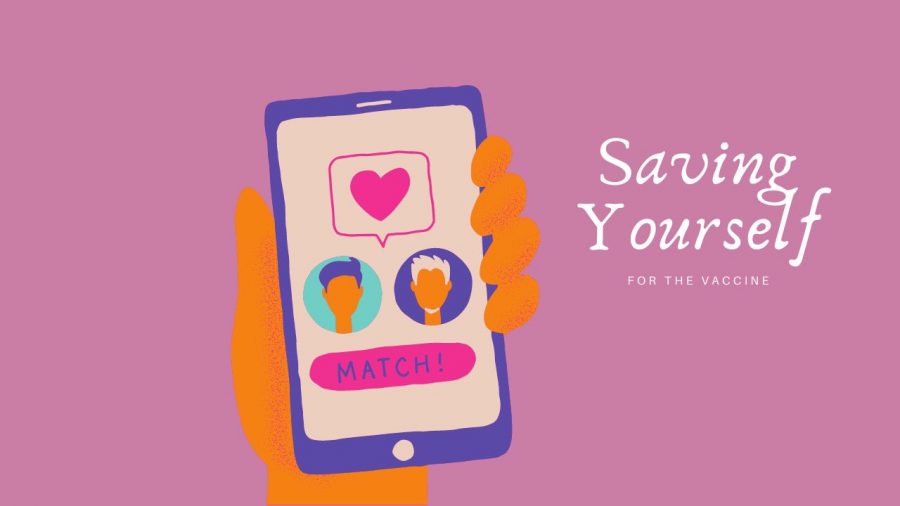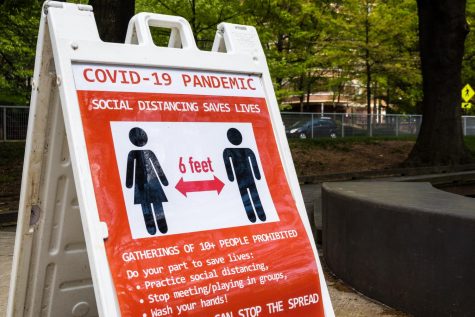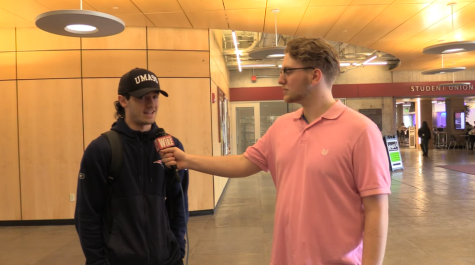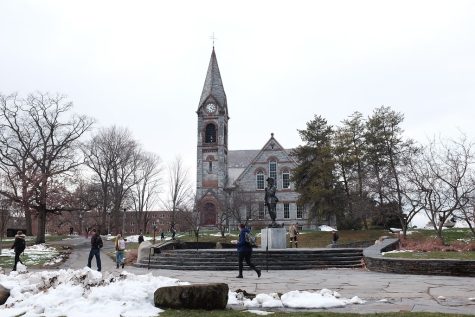Saving yourself for the vaccine
Hook-up culture takes a hit after the pandemic causes young adults to limit social interaction
Due to the coronavirus, also known as COVID-19, the public has started to theorize that the virus is killing the future of our sex lives as countries have been on lockdown.
Sarah Estridge, a 21-year-old student from North Carolina State University, believes that COVID-19 has killed the dating scene – specifically, the hook-up culture of the current generation and her personal path to sexual freedom. Hooking up is often defined as “just sex,” according to dating apps like Tinder. However, to Estridge, hooking up can be explained as the idea that, “you don’t need to be in a relationship to hook up with somebody, I can go out and have consensual intercourse whenever if I wanted to.” But she does admit that her approach has adjusted since COVID-19.
Estridge has seen more of the university hook-up life than most people. Being an ex-sorority sister, she is not shy about the horror stories from her friends. But lately, she and her friends are all committed to occasional celibacy in order to stay healthy.
Since the first wave of cases, most U.S. officials have been advising citizens to stay inside or wear protective face coverings when social-distancing is not possible. Nonetheless, as of December 1st, COVID-19-related deaths surpassed 200,000 in the U.S.
After months of recommended isolation, some Americans have been driven to extreme circumstances of negligence due to the loss of their social lives. Estridge noticed that this switch of health in society has heavily affected her previously active dating culture. Her dating life has severely deteriorated. She’s hooked up with only two people this year, and while she used to go on about five dinner dates per month, she hasn’t gone on any since mid-September.
“With COVID-19, I have become more selective with my time,” she says recalling the two men that have landed into her bed for a one-night stand this past month. “Since COVID-19, no one wants to randomly hook up anymore because most people, in general, want to be safe and not spread [COVID-19] more than necessary.”
Estridge said that before these recent hookups, she took the time to talk to these men, through text, and learn what safety precautions they were taking.
“Before COVID-19, you could go to a party or a club and hook-up with someone and be consensual but now in the back of my head, I have to think about if I hook up with this person am I going to get infected,” she said.
During a nine-question Google survey, random participants were asked similar questions surrounding their hook-up life, or the lack of one. Most participants agreed with Estridge that one-night stands are no longer essential. Within the 20 anonymous participants, over 50% agreed that due to the coronavirus it is harder for them to feel safe while engaging in casual sex. It seems as if the fear of contracting the virus has annulled a popular nightly activity.
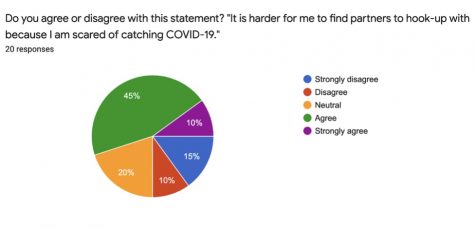
Stephanie Cohan, a medical director of San Francisco City Clinic, understands how this fear can drive people away. In an interview with KQED, she discusses that in bed, “you’re definitely close enough to have a risk of being infected via those [respiratory] particles” that partners are exhaling. Kissing can double the increase of contracting the virus due to the exchange of saliva, according to Cohan.
People have a right to fear casual sex right now because having sex with someone, with whom you are not living together, could carry the virus even if they appear not to.
However, not everyone is fearing sex similar to Estridge and the other 10.4% of participants from the short survey. Cohan recognizes that people have not stopped having sex during the coronavirus, and recommends that if casual sex is still on the table there are extra precautions that should be heeded.
In order to minimize infectious saliva and respiratory secretions, Cohan suggests that partners should wear a mask in bed, have quick sex, downplay face-to-face sex positions, and avoid exchanging fluids through oral stimulation. Cohan reaffirms her last item of advice for safe sex, to combine oral sex with condoms. It can be argued that this is one of the most important pieces of advice, as coronavirus was just recently “detected in the semen of people who have or are recovering from the virus,” according to the Mayo Clinic research facility.
As always, it is important to wash your hands and wear protective birth control if a person is going to engage in casual sex, but it is especially prudent during a pandemic.
“It’s so easy to get infected from coronavirus. If I could get it from going to Target, of course, I could get it from having sex,” says Estridge. “It’s important to have more trust now during these times with everyone, especially with strangers on dating apps. If somebody does risky behavior and lies to me into trying to get laid – that would be the same to me as someone having an STD and lying about it. It’s absurd,” said Estridge.
Estridge details that there is “a new stigma of societal shame” if people have sex with multiple partners right now. Although Cohan does not outwardly note this norm, she does believe that people should limit casual sex to one partner right now.
Cohan is quoted by KQED, that “decreasing the network size” of sexual partners will decrease the spread of the coronavirus.
However, it is important to continue practicing safe sex and testing for the virus.
It is true that hook up culture has taken a significant drop because of the current pandemic, but some people, like Estridge, are still trying to find ways to make an intimate connection. Even if some may have sex with masks on to lessen their fear of casual sex as Cohan endorses.
Email Brie at bbristol@umass.edu or follow her on Twitter @brie_bristol

